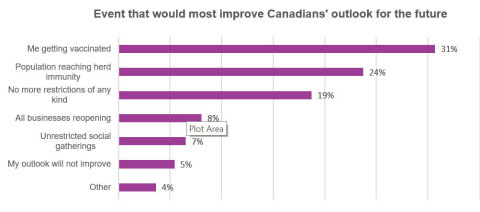LifeWorks Inc. (formerly Morneau Shepell), a leading provider of technology-enabled total wellbeing solutions, today released its monthly Mental Health Index™ report, revealing a negative mental-health score among Canadians for the thirteenth consecutive month. The Mental Health Index™ score for April is -10.7. Negative scores indicate a lower level of mental health compared to the pre-pandemic benchmark.
This press release features multimedia. View the full release here: https://www.businesswire.com/news/home/20210527005077/en/

(Graphic: Business Wire)
The April 2021 score is slightly higher than it was March 2021 (-11.2). In April, the majority of sub-scores showed improvement over the previous month. The anxiety sub-score improved the most when compared to March, from -12.7 to -11.6 month-over-month. This positive trend also extends to the psychological health sub-score, which increased from -3.9 to -3.3, beginning to reverse a previous trend of steady declines since the inception of the index. While this is positive, all sub-scores excluding financial risk remain well below the pre-pandemic benchmark, indicating that Canadians’ mental health remains at significant risk.
“Canada has experienced an uneven recovery in the past month, with more restrictive lockdowns and uncertainty about vaccine availability causing continued feelings of isolation and uneasiness. This appears to have taken a positive turn in recent weeks, with lowering case counts contributing to a positive shift in optimism. The mental health of working Canadians, however, is still well below the level it was prior to the pandemic,” said Stephen Liptrap, president and chief executive officer. “Employers must recognize the long-term consequences of this and take the appropriate steps to get ahead of future uncertainty and mental strain by providing accessible mental-health support to employees. In instances where Canadians do not have access to these programs through their employer, it’s great to see Ontario, Manitoba and Saskatchewan as examples of provincial governments who have stepped in to provide free mental-health programs, such as AbilitiCBT and others, for residents as a response to the pandemic.”
Affordability of mental health care remains greatest concern for Canadians
Despite relentless efforts to increase awareness about the long-term implications of declining mental health, many Canadians have been reluctant to access mental-health support due to several barriers. To date, only 54 per cent of respondents feel they do not need support, 31 per cent have taken steps to improve their mental health and another 14 per cent have not taken steps but would like to. Within the latter group, 30 per cent report that affordability of care is the greatest barrier to mental health improvement, followed by having no energy to seek care (29 per cent), uncertainty about the proper care for their needs (27 per cent) and having no time (24 per cent). The research also revealed that individuals identifying as female were most likely to report a lack of energy (34 per cent) and discomfort sharing their concerns (21 per cent) as the top barriers, compared to 24 per cent and 17 per cent of those identifying as male, respectively.
“There are two very significant issues at play with the reluctance to seek care. First is that people often do not realize the options available to them like their employer-sponsored employee assistance program, health benefits and other sustainable wellbeing solutions. The majority of the Canadian population has access to employer-paid mental-health support and many may not be aware,” said Paula Allen, global leader and senior vice president, research and total wellbeing. “The second issue is that delaying care during this prolonged period of strain, actually makes things worse and more difficult to deal with in the longer-term. Better awareness of options – the willingness and encouragement to use them – is essential to our long-term mental health.”
Vaccine anticipation improving Canadians’ outlook for the future
In April, the research found that nearly one third (31 per cent) of Canadians reported that getting vaccinated against COVID-19 would improve their outlook for the future, followed by 24 per cent looking forward to the population reaching herd immunity and 19 per cent of employees’ outlook being influenced by there no longer being restrictions. These groups also reported the most favourable mental health scores (-9.1, -9.6 and -9.0, respectively).
About the Mental Health Index™
The monthly survey by LifeWorks was conducted through an online survey in English and French from March 22 to April 2, 2021, with 3,000 respondents in Canada. All respondents reside in Canada and were employed within the last six months. The data has been statistically weighted to ensure the regional and gender composition of the sample reflect this population. The Mental Health Index™ is published monthly, beginning April 2020, and compares against benchmark data collected in 2017, 2018, 2019. Click here to read the Canadian Mental Health Index™ report.
About LifeWorks
LifeWorks is a global leader in delivering technology-enabled solutions that help clients support the total wellbeing of their people and build organizational resiliency. By improving lives, we improve business. Our solutions span employee and family assistance, health and wellness, recognition, pension and benefits administration, retirement and financial consulting, actuarial and investment services. LifeWorks employs approximately 7,000 employees who work with some 24,000 client organizations that use our services in more than 160 countries. LifeWorks is a publicly traded company on the Toronto Stock Exchange (TSX: LWRK). For more information, visit lifeworks.com.
ID-CORP, ID-MH
View source version on businesswire.com: https://www.businesswire.com/news/home/20210527005077/en/
